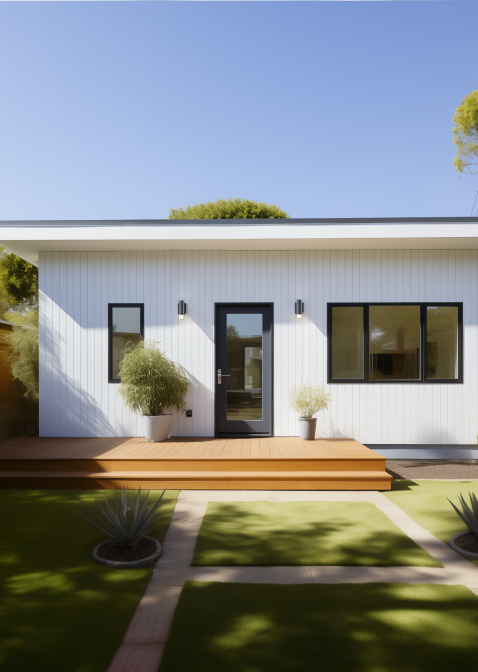ADUs have become a trend in recent years. Tremendous numbers of homeowners want to have it on their lot. But many people still don’t understand what it is. Well, ADU means Accessory Dwelling Unit, which represents a building located on the same lot as the main residency and has all the necessary utilities. According to the legislation, ADUs are smaller in size, ranging from a few hundred square feet to around 1,200 square feet.
ADUs are really versatile as they may be used in any possible way, from guest house to home office. Backyard cottages allow the homeowners to customize this space according to their needs and lifestyle. These structures can enhance a property’s functionality and value, making them an attractive option to consider to generate value as nothing seems to be able to beat them in popularity in urban areas where housing is in high demand.
Before building ADUs one has to get acquainted with a variety of zoning and building regulations, as well as possible needed permits and inspections. These tiring tasks are often delegated to the general contractors whose tasks are to build an ADU and check whether it fits the local regulations. If you want to find out more about them, continue reading our article.
For sure, adding a backyard cottage to your lot increases the total amount of square meters of your property. To make it clear for you, let us cite several examples from our experience. Creating a detached backyard cottage can add anywhere from 400 to 1,200 square feet of living space, while a basement conversion can add an additional 500 to 1,500 square feet. What is more, building an ADU may also increase the overall square footage of the property, however, it has to be double-checked with the zoning regulations in the area.
Accessory Dwelling Units in California must comply with specific characteristics and regulations set by state law.
Some of these characteristics include:
ADUs in California are limited in size to no more than 1,200 square feet for units with two or more bedrooms, or 850 square feet for a single bedroom unit.
Before scheduling a meeting with your contractor, make sure that you have one or more off-street parking places.
ADUs must be located in a residential zone and meet all local zoning and building requirements.
It is advisable to connect ADUs to the utilities of the main residency to avoid any inconveniences.
ADUs must be owned by the owner of the primary residence. Moreover, it is impossible to sell it separately.
These are just a few of the specific characteristics that apply to ADUs in California. Remember to consult with local authorities and a qualified general contractor to ensure that all regulations are met. After this you can safely approach the construction of an ADU.
ADUs, or Accessory Dwelling Units, provide many benefits for homeowners, including:
Overall, ADUs offer homeowners a wide range of benefits, making them a popular choice for those looking to increase the value and functionality of their property.
Adding an ADU to a property can have a significant impact on its overall value, with studies suggesting an average increase of 25%. However, the exact value added can vary based on several factors, such as location, size, design, and local market conditions. For instance, a $500,000 property may see a $125,000 increase in value after the construction of an ADU. It’s important to note that the cost of building an ADU may not directly equate to the added value it brings to a property, and the actual value boost can depend on individual circumstances. Ultimately, ADUs offer a valuable investment opportunity, providing additional living space, rental income, and a sustainable housing solution.
Backyard cottages, or ADUs, are compact and independent living spaces that can be built on the same lot as a primary residence. The advantages of constructing an ADU are manifold, ranging from boosting a property’s value to offering sustainable and flexible housing solutions. In addition to generating rental income, ADUs can serve as an extra living space for guests or family members, or be used as a dedicated workspace. The value of an ADU’s addition can vary by factors like location, size, and design, with studies indicating an average 25% value increase.
Ultimately, ADUs are a valuable and versatile option for homeowners looking to expand living space and generate income.











